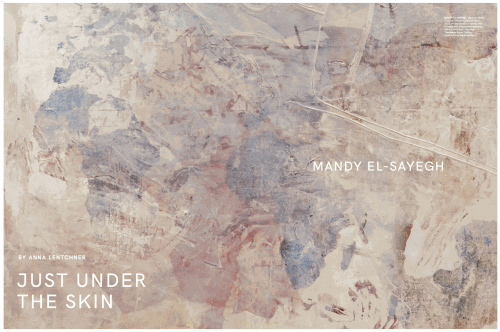"There is a terror in excess," Mandy El-Sayegh told The Guardian in 2019. The London-based artist was referring to the abundance in her work, to the mass of material and symbolism that seemingly engulfs viewers of her large-scale collage-paintings. We see this in the texturally dense canvas Burning Square: prayers for rest (2023), with its streaked red background, illegible calligraphy, overlaid Palestinian keffiyeh scarf motif, silkscreened image of the United States one-hundred-dollar bill, and an Evening Standard newspaper cutout which reads "Israel pounds Gaza as the ground war looms." These elements are not personal in an obvious sense-she prefers to allude to the historical, the scientific, the cultural, the philosophical-yet buried within them is a kind of reverse self-portrait, one that, underneath its many layers, exposes the artist's innermost psyche.
El-Sayegh identifies as a "collagist," positioning this obsessive act of gathering, cutting, and layering as central to both her process and her final product. It is a dissection of imagery and language that has even extended beyond her own artmaking, to providing care for nonverbal autistic youths and working as an art therapist. She took up both roles in the years following her master's degree from the Royal College of Art in 2011, but eventually became disillusioned with government systems of social work and returned to artmaking full-time. The Guardian interview was published at a turning point in her career: conducted ahead of her debut institutional solo exhibition, "Cite Your Sources" at Chisenhale Gallery, and published the same day that New York gallery Lehmann Maupin announced its representation of El-Sayegh, the article described her as an "up-and-coming" artist who "talks fast." She had grown fast, too. In the following months she held solo exhibitions in Hong Kong, Paris, and Beirut, and contributed to group exhibitions in Berlin and New York. But then came a global pandemic and a nationwide lockdown, and the "terror in excess" that El-Sayegh had articulated once again began to take root-not in her work, but in her own body.

